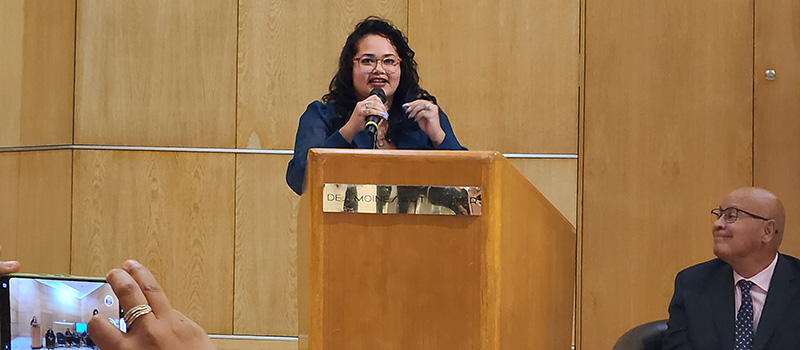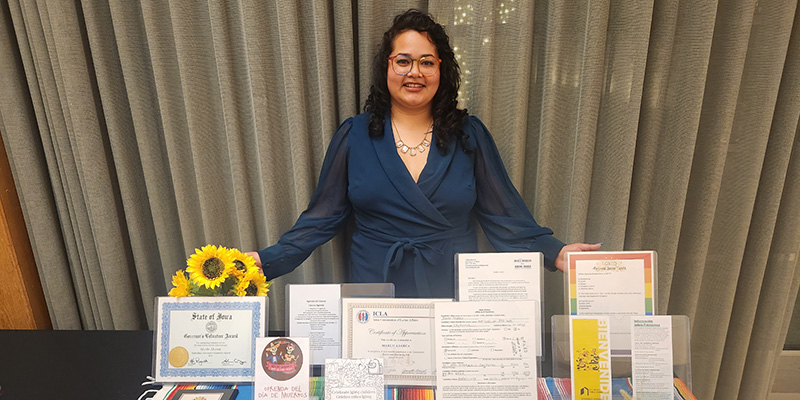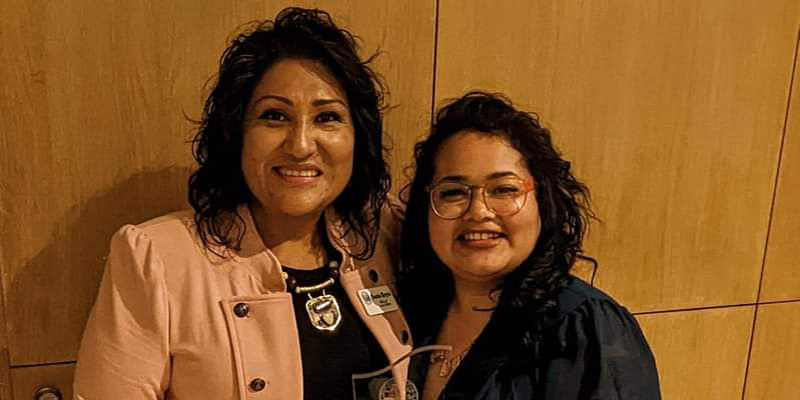Marlú Abarca ’14 inducted into the Iowa Latino Hall of Fame
November 17, 2022 — When Marlú Abarca ’14 first sat on the nominating committee for the Iowa Latino Hall of Fame in 2018, they recalled how the people who made nominations – family, friends, and community members – brought in “binders and binders of evidence” testifying to the decades long impact the nominees had on their community.
When Abarca was themselves nominated for the Hall of Fame this year, she laughed and wondered aloud if their 12 years of accomplishments “could fill a two-pocket folder.”
Self-deprecation aside, Abarca’s time advocating for a more inclusive Grinnell campus as one of the leaders of the Student Organization for Latinxs (SOL), their youth-empowering 2019 run for an at-large Des Moines City Council seat, and organizing the first and largest bilingual satellite caucus site on the south side of Des Moines in 2020 are all accomplishments that speak for themselves.
 Marlú Abarca ’14 gives a speech during the Iowa Latino Hall of Fame induction ceremony Oct. 15 at the Des Moines Arts Center. Fellow inductee Joe Gonzalez looks on.
Marlú Abarca ’14 gives a speech during the Iowa Latino Hall of Fame induction ceremony Oct. 15 at the Des Moines Arts Center. Fellow inductee Joe Gonzalez looks on.
On Oct. 15, the final day of Latino Heritage Month, Abarca was inducted into the Iowa Latino Hall of Fame as part of its sixth class of honorees. During the ceremony, she also received the Iowa LGBTQIA Leadership Award for her outstanding and significant cultural, political, social, and economic contributions to the state.
“Since arriving in Iowa in 2010, I’ve organized, canvassed, marched, and protested all to ensure that Iowa is better than the way that I’ve found it,” Abarca said during the induction ceremony.
Abarca has done all that by “speaking my truth and using my voice.” It’s something they credit feeling empowered to do at Grinnell.
“We were in a culture of self-governance at Grinnell,” they say. “The student affairs staff was supportive of student autonomy and critical thinking. When I graduated, I felt empowered to speak my opinion, in a diplomatic way of course. Grinnell helped me see, and now I can’t unsee, all the biases that exist and how they affect social and power dynamics.”
Abarca identified Narren Brown, former director of intercultural engagement and leadership at Grinnell, as particularly impactful.
“Narren was very affirming and always knew how to validate people,” Abarca says. After a bias-motivated incident occurred, Brown helped Abarca become more aware of their surroundings. “At the time, I had no idea how people perceived me on a day-to-day basis. Having grown up as part of a Latinx majority in California, I came to Iowa with this blissful ignorance. The way I looked and my presence on Grinnell’s campus was not normalized.”
 Abarca is surrounded by examples of their achievements and accomplishments at the induction ceremony.
Abarca is surrounded by examples of their achievements and accomplishments at the induction ceremony.
During their senior year, Abarca interned with nonprofit organization Al Exito and separately put together a group of bilingual and bicultural Grinnellians who would mentor a cohort of Latina students at South Tama Middle School.
“We talked to these students about being Latinx in Iowa. I was so privileged to grow up with my culture in California,” Abarca says. “The students would talk about the bullying they experienced and endured all because they would speak Spanish – their first language – to each other.”
One day in spring 2014, when Abarca was on the fourth floor of Burling Library, they got a call from staff members at Drake University. Abarca was offered an Americorps Vista position that would be shared between Drake and the Iowa College Student Aid Commission. The catch? They had 24 hours to accept or decline because of grant restrictions.
They said yes, and the rest is history. Abarca traveled to Naperville, Illinois, for a two-week intensive course on the Free Application for Federal Student Aid (FAFSA) before relocating to Des Moines. Abarca became one of only a handful of bilingual and bicultural FAFSA experts in the state.
“I was traveling across Iowa, going to different colleges and towns, giving FAFSA presentations in Spanish to families who had never heard of it and students who had never thought they could afford college, let alone qualify for federal subsidies,” Abarca says. In Des Moines, Abarca bumped into Dawn Martinez Oropeza, the executive director of Al Exito, who encouraged Abarca to join the nonprofit’s board of directors. Abarca went on to serve as board president.
 Abarca poses for a picture with Sonia Reyes, executive officer of the Iowa Office of Latino Affairs.
Abarca poses for a picture with Sonia Reyes, executive officer of the Iowa Office of Latino Affairs.
In 2016, Abarca was appointed to the state of Iowa’s Commission on Latino Affairs by then Gov. Terry Branstad. The Commission, one of a broad range of advisory boards, councils, and commissions, are advisers to the governor. At least in theory, Abarca says. Current Gov. Kim Reynolds responded to the Commission on Latino Affairs meeting requests once between 2017 and 2020 according to Iowa Public Radio.
“The only years where we were able to schedule a meeting, they would get canceled an hour before on the day of. It was really frustrating, and it sent a message,” Abarca says. In spite of Reynolds’ absenteeism, the Commission continued to vocally advocate for Latinx Iowans including pushing for bilingual COVID information and briefings, and creating the Latino Hall of Fame.
“Being able to nominate, recognize, and celebrate people of Latin-American descent who’ve made a significant contribution to Iowa was our way of helping to condemn white privilege in the state,” Abarca says. “Everyone who enters the Iowa Historical Building sees the names of all the people who’ve been inducted. You live on in Iowa history.”
As part of the Hall of Fame nomination committee, Abarca became aware of a relatively young, posthumous inductee, Warren Morrow ’99.
The Latina Leadership Initiative, a culturally specific program that Abarca graduated from, was pioneered by Morrow on Grinnell’s campus. “It’s been wild to learn over the years how much Warren’s work continues to impact me now,” Abarca says. “Warren will never know how much his life impacted my own, how much he’s done for Latinos, and how much he’s done for Iowa.”
In terms of paying it forward, Abarca has returned to campus to speak with students and encourages alums, particularly white alums, to be concerned for Black and Brown students. “Right now, Black students are experiencing insecurity and unsafety on campus,” they say. “We need to step up and do something about it. Please lend your support and stand beside the College.”
— by Joe Engleman ’14